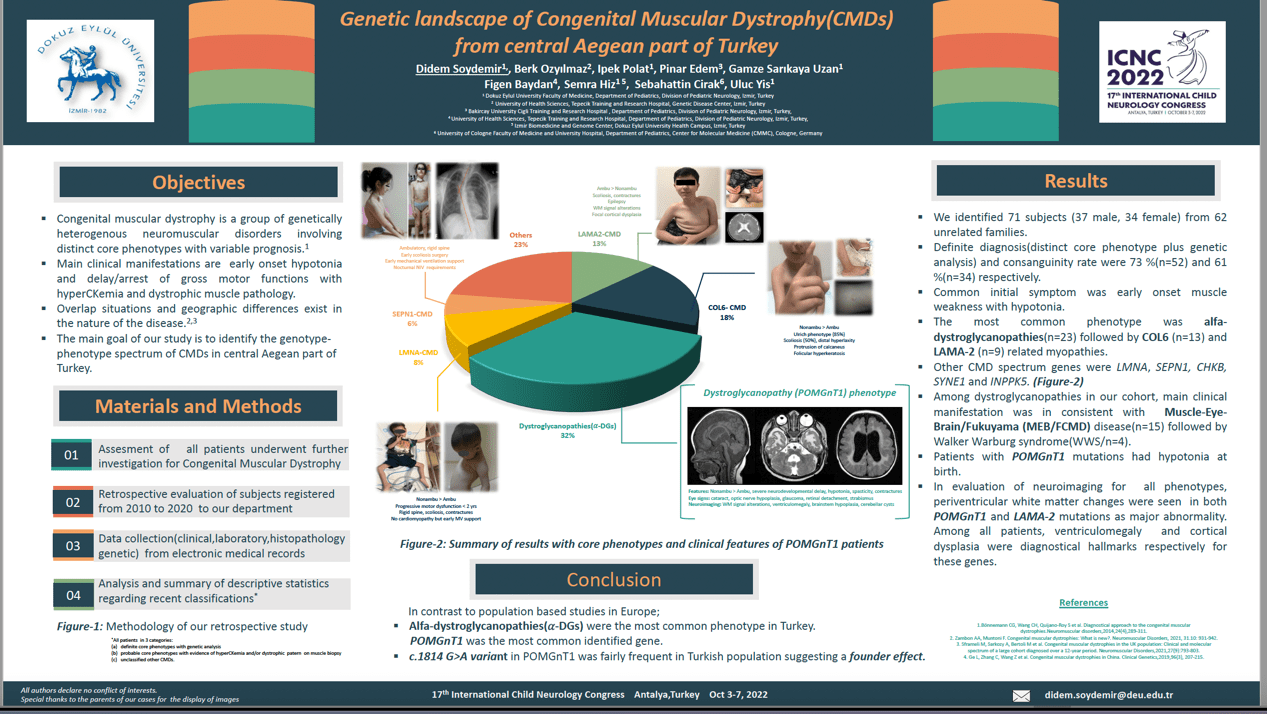GENETIC LANDSCAPE OF CONGENITAL MUSCULAR DYSTROPHIES(CMD) FROM CENTRAL AEGEAN PART OF TURKEY
Didem Soydemir, Berk Özyılmaz, Ipek Polat, Pinar Edem, Gamze Sarıkaya Uzan, Figen Baydan, Semra Hiz Kurul, Sebahattin Çirak, Uluc Yis
OBJECTIVES: Congential muscular dystrophies(CMDs) are a group of genetically hetereogenous neuromuscular disorders involving distinct core phenotypes with variable prognosis.The main goal of our study is to identify the genotype-phenotype spectrum of CMDs in central Aegean part of Turkey.
MATERIALS and METHODS: The subjects registered from 2010 to 2020 to the pediatric neurology department of Dokuz Eylul University were enrolled.Regarding recent classifications the patients were described as follows:(a) definite core phenotypes with genetic analysis (b) probable core phenotypes with evidence of elevated CK levels and/or dystrophic patern on muscle biopsy (c) unclassified other CMDs.
RESULTS: We identified 71 subjects(37 male,34 female) from 62 unrelated families.Confirmed genetic diagnosis and consanguinity rate were 73 %(n=52) and 61 %(n=34) respectively.The most common presenting symptom was early onset muscle weakness.The most common phenotype was alfa-dystroglycanopathies(n=23) followed by COL6-RD(n=13) and LAMA2-RD(n=9).Other relatively common phenotypes were LMNA related CMD(n=5),SEPN1 related myopathy(n=4) and megaconial(CHKB,n=4) CMDs. Among alfa-dystroglycanopathies in our cohort,MEB/FCMD was the most common subtype with structural brain abnormalities and eye involvement.POMGnT1 was the most common mutated gene.
CONCLUSION: In contrast to population based studies in Europe, alfa-dystroglycanopathies are the most common phenotype in Turkey and c.1814 G>A mutation in POMGnT1 is frequent in Turkish population suggesting a founder effect. References: 1- Zambon AA, Muntoni F. Congenital muscular dystrophies: What is new?. Neuromuscular Disorders, 2021, 31.10: 931-942. 2. Sframeli M, Sarkozy A, Bertoli M et al. Congenital muscular dystrophies in the UK population: Clinical and molecular spectrum of a large cohort diagnosed over a 12-year period. Neuromuscular Disorders,2021,27(9):793-803.
Keywords: hypotonia, dystrophy, scoliosis, congenital, creatine kinase
Didem Soydemir
Dokuz Eylul Unıversıty Faculty of Medıcıne,Izmir,Turkey
Turkey
Berk Özyılmaz
University of Health Sciences,Tepecik Training and Research Hospital,Izmir,Turkey
Turkey
Ipek Polat
Dokuz Eylul Unıversıty Faculty of Medıcıne,Izmir,Turkey
Turkey
Pinar Edem
Bakircay University Cigli Training and Research Hospital,Izmir,Turkey
Turkey
Gamze Sarıkaya Uzan
Dokuz Eylul Unıversıty Faculty of Medıcıne,Izmir,Turkey
Turkey
Figen Baydan
niversity of Health Sciences,Tepecik Training and Research Hospital,Izmir,Turkey
Turkey
Semra Hiz Kurul
Dokuz Eylul Unıversıty Faculty of Medıcıne,Izmir,Turkey
Turkey
Sebahattin Çirak
University of Cologne,Faculty of Medicine and University Hospital ,Cologne
Germany
Uluc Yis
Dokuz Eylul Unıversıty Faculty of Medıcıne,Izmir,Turkey
Turkey
OBJECTIVES: Congential muscular dystrophies(CMDs) are a group of genetically hetereogenous neuromuscular disorders involving distinct core phenotypes with variable prognosis.The main goal of our study is to identify the genotype-phenotype spectrum of CMDs in central Aegean part of Turkey.
MATERIALS and METHODS: The subjects registered from 2010 to 2020 to the pediatric neurology department of Dokuz Eylul University were enrolled.Regarding recent classifications the patients were described as follows:(a) definite core phenotypes with genetic analysis (b) probable core phenotypes with evidence of elevated CK levels and/or dystrophic patern on muscle biopsy (c) unclassified other CMDs.
RESULTS: We identified 71 subjects(37 male,34 female) from 62 unrelated families.Confirmed genetic diagnosis and consanguinity rate were 73 %(n=52) and 61 %(n=34) respectively.The most common presenting symptom was early onset muscle weakness.The most common phenotype was alfa-dystroglycanopathies(n=23) followed by COL6-RD(n=13) and LAMA2-RD(n=9).Other relatively common phenotypes were LMNA related CMD(n=5),SEPN1 related myopathy(n=4) and megaconial(CHKB,n=4) CMDs. Among alfa-dystroglycanopathies in our cohort,MEB/FCMD was the most common subtype with structural brain abnormalities and eye involvement.POMGnT1 was the most common mutated gene.
CONCLUSION: In contrast to population based studies in Europe, alfa-dystroglycanopathies are the most common phenotype in Turkey and c.1814 G>A mutation in POMGnT1 is frequent in Turkish population suggesting a founder effect. References: 1- Zambon AA, Muntoni F. Congenital muscular dystrophies: What is new?. Neuromuscular Disorders, 2021, 31.10: 931-942. 2. Sframeli M, Sarkozy A, Bertoli M et al. Congenital muscular dystrophies in the UK population: Clinical and molecular spectrum of a large cohort diagnosed over a 12-year period. Neuromuscular Disorders,2021,27(9):793-803.
Keywords: hypotonia, dystrophy, scoliosis, congenital, creatine kinase
Didem Soydemir
Dokuz Eylul Unıversıty Faculty of Medıcıne,Izmir,Turkey
Turkey
Berk Özyılmaz
University of Health Sciences,Tepecik Training and Research Hospital,Izmir,Turkey
Turkey
Ipek Polat
Dokuz Eylul Unıversıty Faculty of Medıcıne,Izmir,Turkey
Turkey
Pinar Edem
Bakircay University Cigli Training and Research Hospital,Izmir,Turkey
Turkey
Gamze Sarıkaya Uzan
Dokuz Eylul Unıversıty Faculty of Medıcıne,Izmir,Turkey
Turkey
Figen Baydan
niversity of Health Sciences,Tepecik Training and Research Hospital,Izmir,Turkey
Turkey
Semra Hiz Kurul
Dokuz Eylul Unıversıty Faculty of Medıcıne,Izmir,Turkey
Turkey
Sebahattin Çirak
University of Cologne,Faculty of Medicine and University Hospital ,Cologne
Germany
Uluc Yis
Dokuz Eylul Unıversıty Faculty of Medıcıne,Izmir,Turkey
Turkey

Didem Soydemir
Dokuz Eylul Unıversıty Faculty of Medıcıne,Izmir,Turkey
Dokuz Eylul Unıversıty Faculty of Medıcıne,Izmir,Turkey